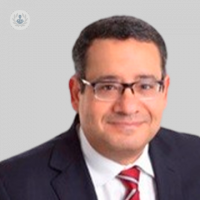What to know about endometriosis
Written in association with:Endometriosis is a gynaecological condition where the endometrium tissue, which grows as a layer lining the uterus, grows in other places outside of the uterus, such as the bowels and the bladder. This can cause pain, and abnormal periods, and negatively impact fertility. In this article, consultant obstetrician and gynaecologist Mr Yousri Afifi shares his expertise on endometriosis, its symptoms, and how it can be treated.

Endometriosis is a common condition. It is estimated that 1 in 10 menstruating people worldwide are afflicted with it. It is a chronic condition, and cannot be “cured”, but there are treatments to help manage it.
What is endometriosis?
During ovulation, oestrogen is released into the body. It has many functions, and one of them is to cause the endometrium to thicken so that it can support a fertilised egg. But if the egg is not fertilised and cannot implant itself in the uterus, then menstruation happens, where the egg, blood, and the endometrium break down so that they can be shed vaginally. With endometriosis, the endometrium that grows in other places of the body also will thicken and begin to break down to be menstruated, but because of where it is located, it cannot be purged and remains trapped in the body. This tissue that is left behind can cause internal scarring, organ adhesion, and cysts.
This can cause a lot of pain, but some people may have asymptomatic endometriosis and may not know of their affliction until they struggle to intentionally get pregnant.
Endometriosis can occur anywhere in the body, including the lungs and heart! But it is most common on:
- The ovaries
- The fallopian tubes
- Bladder
- Rectum
- Lining of the pelvic cavity
What causes endometriosis?
There is no definitive cause of endometriosis, but leading theories include that of immune system function, stem cell behaviour, genetics, and retrograde menstruation, which suggests that sometimes, the menstrual blood and tissue that is supposed to exit the body instead flows upwards, through the fallopian tubes into the pelvis, where the endometrial cells can spread, attaching themselves to structures and growing anew.
What are the symptoms of endometriosis?
The symptoms of endometriosis are:
- chronic pelvic pain
- pain during menstruation and painful cramping
- abnormal menstrual bleeding and bleeding between periods
- pain during sex or vaginal penetration
- pain when urinating or defecating
- stomach issues such as diarrhoea, constipation, or bloating
- fatigue
How is endometriosis diagnosed?
To diagnose endometriosis, a doctor or gynaecologist with review the patient’s medical history and conduct a pelvic exam. They will ask the patient about their symptoms and menstruation experiences. If they suspect the condition to be endometriosis, there will need to be some further tests to examine the pelvis to confirm the diagnosis. To help them see the extent of the effect of the condition on surrounding tissues, they may perform an ultrasound (specifically a transvaginal one), or an MRI. A definitive diagnosis, however, can only be achieved with a laparoscopic procedure, where a surgeon makes a small incision in the abdomen and inserts the small and thin tubular camera, called the laparoscope so that they may view the inside of the pelvis in real-time and full colour. During the procedure, the surgeon can additionally take samples of the tissue for analysis (called a biopsy), or begin some treatment by removing some of the damage in the form of growths and cysts.
How is endometriosis treated?
Currently, there is no cure for endometriosis, and it can only be managed to reduce pain and symptoms. Treatment can be medicinal, surgical, or both. The best treatment plan will be designed with consideration of a patient’s symptoms, age, plans for future pregnancies, and the extent of the tissue growth.
Medication tends to be the first method used for treating endometriosis, such as:
- Painkillers for pain management, like ibuprofen or paracetamol. These can be prescribed or purchased over the counter.
- The combined contraceptive pill, which contains oestrogen and progestin (a synthetic form of progesterone), is used to suppress the ovaries and pause or lighten the period and will thus ease the pain. The hormonal coil can also be used with the same effects.
- Gonadotrophin-releasing hormone (GnRH) antagonists are administered via injection and halt the period entirely by lowering the oestrogen levels in the body. They also help shrink endometriosis-related growths and pain, but can cause menopausal-like symptoms.
If medicinal treatment is unfruitful, the option of surgery is available. Using again the laparoscopic technique, surgeons can excise or destroy scar tissue and growths with blades, lasers, or electricity (electrocautery). This can help to alleviate pain, but it is temporary as the endometriosis is still present and the tissue can regrow. For those wishing to become pregnant, then this method would be the most effective for boosting fertility rates.
A hysterectomy may be performed for patients who have not responded to other treatments and have no wish for future pregnancies, as this procedure will render patients infertile and is irreversible. It is highly effective for reducing pain and may even “cure” the condition, but there still remains the risk of the tissue regrowing.
If you believe you are struggling with endometriosis and would like to explore treatment options, you can consult with Mr Afifi via his Top Doctors profile.


